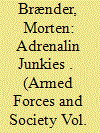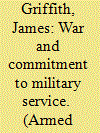| Srl | Item |
| 1 |
ID:
143278


|
|
|
|
|
| Summary/Abstract |
This article calls for military sociologists to contribute to the study of excitement motivation. Bravery has always played a dominant role in depictions of soldiers in popular culture, and the importance of concepts similar to excitement has been recognized in disciplines adjacent to sociology for decades. Given the transgressive nature of combat, we would intuitively expect soldiers to have their need for thrilling experiences satisfied during deployment, and hence their level of excitement motivation to have decreased when they return from war. However, the opposite seems to be the case. Soldiers return wanting more, and we lack a theoretical explanation why this is the case. This article starts closing this gap by offering one possible reason. And, most importantly, it calls for other researchers to offer other explanations as well. The explanation suggested here is that just like real drug addicts build up a physiological tolerance to narcotics, soldiers can become “adrenalin junkies” because their tolerance toward excitement is “pushed upward” by being exposed to danger. This explanation is tested, and finds partial support, using panel data with soldiers from two Danish companies, serving in Helmand, Afghanistan in 2011.
|
|
|
|
|
|
|
|
|
|
|
|
|
|
|
|
| 2 |
ID:
187102


|
|
|
|
|
| Summary/Abstract |
The present study examined career intentions in two samples—home-based or garrison (N = 12,583 soldiers in 180 companies) and deployed and recently returned soldiers (N = 4,551 in 50 companies). Proportionally, fewer deployed soldiers than home-based garrison soldiers intended to stay in reserve military service. Among deployed soldiers, those who reported having experienced combat trauma, having had wounded or killed someone, and having had a friend killed in combat were less likely to plan to continue military service; reservists more likely to continue military service had returned to the same civilian job after deployment. Among deployed and garrison soldiers, fewer financial difficulties were associated with higher likelihood of continuing reserve military service. Examples from the social constructionist perspective of reserve military service are used to elaborate on mechanisms in these associations.
|
|
|
|
|
|
|
|
|
|
|
|
|
|
|
|